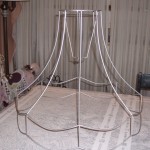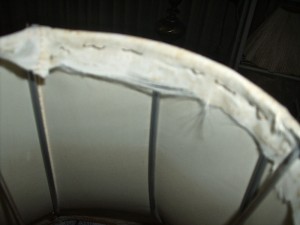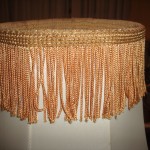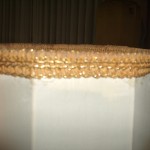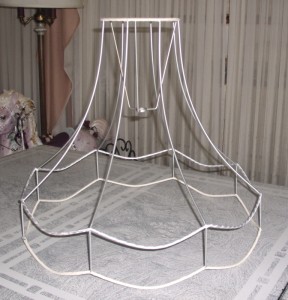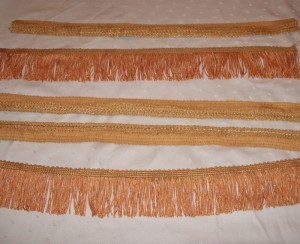Antique Victorian lampshade restoration project. This vintage wire frame was in mint condition. Had I not taken the original cover off, I would have thought the wire was a new purchase and sent to me to be recovered. My customer said the shade has only been in three homes.
I believe this shade was from a manufacturer. The reason I say this, is because the cover was stapled onto the frame. Stapling is not a traditional custom made lampshade application. Also, the fabric was taunt like a drum. To fit a contoured frame with a fabric with no flexibility would be humanly impossible. From what I understand, these manufactured shades are sprayed with a solvent and run through a drying system that shrink wraps the fabric to the frame. I would say that maybe two of the 100’s of shades I have restored have been hand crafted.
The trim is applied after the cover is fitted. In this particular instance, I believe the fringe was an after thought. The reason I say this is because the top fringe was applied on top of the decorative trim around the top of the frame. Fringe is typically applied underneath decorative trim.
This victorian lampshade is now a custom hand crafted shade. I only had to wax the frame to enhance the longevity of the restored shade. I wrapped the top and bottom wires with a twill wrap to be able to sew the new silk cover and new liner to the frame. I used a rayon wrap for the center vertical scallop wire to protect the silk that will lay taunt on the wire.
The original trim cleaned up just beautifully. I rinsed the original trim to remove imbedded dust and let the trim air dry. After rinsing fringe, it has to be trimmed. The original aged trim keeps the originality of the shade and adds character to a newly restored lampshade. Not to mention, vintage trim is impossible to replace.
The lampshade is completely restored. After my customer receives the shade, I will post the finished project.

